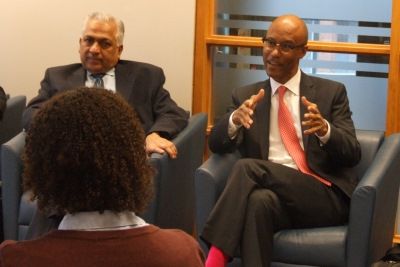
Equity-seeking group members continue to face barriers to entering the legal profession. But they are also leading the way in breaking down these barriers. In an informal conversation with Queen’s Law students, Dhaman Kissoon, Law’89, of Kissoon and Associates, and Frank Walwyn, Law’93, a partner at WeirFoulds LLP, shared their experiences as racialized lawyers and offered practical advice to students on how to be themselves and succeed in the legal profession.
One point the speakers impressed upon students was the fact that the characteristics that made them diverse was also what made them marketable. Walwyn, for example, was able to build a stronger practice by building on his connections in his Caribbean homeland and his ability to practice law in many countries in the Eastern Caribbean.
Walwyn also spoke highly of his experience with his firm, saying he had never felt his status as a black lawyer ever held him back, or that he ever felt discriminated against or treated differently by other lawyers due to his colour. Diversity, for him, has been a competitive advantage and not a hindrance.
Kissoon spoke about how he relies on his background in his criminal practice. Having to experience life through the lens of a racial minority, he is aware of and sensitive to different cultural practices and how they impact upon a person going through the criminal justice system. As a criminal lawyer, he must understand and keep abreast of culture or he may miss a step and not be able to appropriately serve his clients.
However, in Canadian society, there is still work to be done. Kissoon pointed out that racial profiling and carding of minority groups still occurs despite recent legislation aimed to prevent such activity.
Both of the presentation’s speakers are contributors to the new fellowship fund at Queen’s Law honouring Robert Sutherland, a graduate of Queen’s and the first black lawyer in Canada.
Kissoon describes Sutherland as an “almost mythical figure” a prominent black attorney who was the university's first major benefactor during a time of financial crisis. Sutherland, who passed away in 1878, left a large bequest (his entire estate of $12,000, which was a fortune at the time) to Queen’s. The amount was roughly equivalent to the institution's annual operating budget. This donation was the largest the school had ever received, saving it from financial catastrophe in a banking crisis.
Walwyn noted that looking at Sutherland, “it was easy to aspire to excellence,” as he had won many prizes as a student and received an award of merit for debating.
Because Sutherland hailed from the Caribbean, the purpose of the fellowship is to support graduate students from that region. Historically, graduates students have travelled to England for graduate education. The fund provides an incentive to encourage students to pursue their advanced studies at Queen’s.
Queen’s Law has long been dedicated to exploring the issues that minorities and equity-seeking groups face in the practice of law. For 25 years, Kissoon has taught Racism and Canadian Legal Culture, one of the first courses of this type to be offered in Canada. Examining the country’s legal and social history with respect to racism, Kissoon and his students discuss issues such as slavery and property rights, racial profiling in policing, criminal sentencing, immigration and refugees. Through these and other topics, Queen’s Law students explore manifestations of racism in Canadian legal doctrine and the Canadian system of justice.
Read the alumni profile on Frank Walwyn, “a legal powerhouse in two hemispheres,” in Queen’s Law Reports 2015.